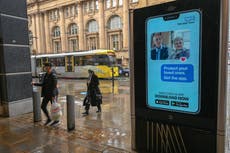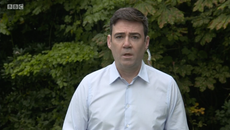Police access to test-and-trace data is another blow to dwindling public trust in the government
The system relies on people getting tested for coronavirus – this decision makes that less likely to happen, writes Ian Hamilton


If, as psychologists suggest, it takes an estimated eight truths to redeem one lie then the government sanctioning of police access to NHS test-and-trace data is going to need a lot of work to recover from such a betrayal of trust.
In selling the virtues of those in England handing over personal information to the government we were assured that this would be confidential. That of course should be a given and not need the emphasis it was given when the system was introduced.
Now we know there are caveats to “confidentiality”, your personal information will potentially no longer be confidential if you have to self-isolate.
One of the least effective methods of gaining compliance is by force, far better and more effective is to win hearts and minds. If people know why they are being asked to make personal sacrifices and inflict self-quarantine on themselves then compliance improves. Add to that by providing evidence of how effective and equitable the rule is, then compliance steps up another notch.
At the beginning of the pandemic this seemed to be the government’s approach and by and large it worked in as much as the population were willing to comply. That has clearly changed, although It’s difficult to pinpoint exactly when it happened. We are no longer treated like adults but as wayward children in need of discipline.
There is no clearer example of how trust has broken down between the government and its people than the opening of the door to invasive policing of the rules.
There are so many problems with this approach that its difficult to know where to begin. Whichever government minister or special adviser proposed this idea couldn’t have been ignorant of the consequences – after all government has access to some of the most brilliant behavioural psychologists that we have. They must have made it clear how such a move would put off some people from getting tested as they fear the consequences of a police visit.
On the off chance this hasn’t happened, the British Medical Association has warned of the consequences. So, at a time when vast resources and effort are being put into enhancing the test and trace system, this latest move significantly jeopardises uptake of tests.
Politicians still don’t seem to understand that the reason some people don’t self-isolate is not that they are anarchists – but they simply can’t afford to. Little point in obeying the rules to avoid Covid but to then starve. The Manchester mayor, Andy Burnham, and others are advocating for their local populations to have increased resources that allow people to comply to the rules if new measures are to be imposed.
It’s easier to obey restrictions like self-isolation when you have financial security, which most of the cabinet and those advising them do. Poverty is not an “issue” that many politicians have first-hand experience of.
Whether its individuals or city mayors the government has moved from a position where we’re all in this together to one of viewing everyone as deviant or awkward. It’s already clear that we are to blame for the decision to pass information to the police, it is necessary.
Still, the government is running out of people to blame for failures in its own policy and approach to Covid-19. At the start of the pandemic it was care homes, then young people and then students.
The latest apportioning of blame doesn’t single out any one group but instead throws into doubt the honesty of anyone participating in the test and trace system.
Although, previous cuts to police funding mean that the chances of officers having the time or resources to enforce this new policy are about as high as trust levels in this government to protect personal information.




Join our commenting forum
Join thought-provoking conversations, follow other Independent readers and see their replies
Comments